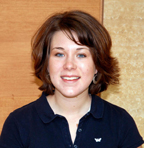Twenty-five students from 10 different undergraduate and community college programs have joined the Institutional Development Award Program (IDeA) Networks of Biomedical Research Excellence (INBRE)/ Biomedical Research Infrastructure Network (BRIN) program.
Established in 2001, the BRIN program was created to expose students to serious biomedical research, build a statewide biomedical research infrastructure between undergraduate and graduate institutions and to strengthen undergraduate institution’s infrastructure and increase its capacity to conduct cutting-edge biomedical and behavioral research.
Today, you’ll meet Katie Wilcox one of the new BRIN scholars on campus.
 Katie Wilcox
Katie Wilcox
Doane College sophomore
Biology major
Q. Who is Katie Wilcox?
A. I’m a sophomore at Doane College majoring in biology with a minor in chemistry. I’m originally from Doniphan, Neb., a small town near Grand Island and Hastings. Outside of academics, I play the saxophone in the symphonic wind ensemble and jazz ensemble. I’ve also been involved in theatre. I also participate in the Doane College Honors Program, the Hansen Leadership Committee, as the chair of the Doane College/Saline County Relay for Life logistics committee, the Beta Beta Beta biology honorary, as the vice president of Cardinal Key, and as the vice president of Omega Psi Theta sorority.
Q. Has science always been a part of your life?
A. When I was younger, I gravitated more toward creative activities such as art and music. However, I’ve always had a curiosity for how things work, and as I moved through high school I realized that science fit my personality and that working in the lab was something I liked to do.
Q. How is it important to you?
A. I think it’s amazing how the research that’s being done today is applicable to everyone. Members of my family have suffered from cancer, leukemia, kidney disease, heart disease, and many more issues that are being addressed in the laboratory. While being a part of the health care profession is very noble, I think the work that is done in the lab every day is often overlooked. Without advancements in research, health care could not improve. So I would say that science is important to me because of the good that I can do for my family and others — it’s one way to make a difference.
Q. Why did you choose to participate in the BRIN program?
A. I am impressed with the BRIN program because I know that no matter which direction I choose to take my biology degree, research experience is going to be useful and applicable. The fact that it is accompanied by a stipend also is very appealing because I am able to accept the position and not have to worry about working another job through the summer.
Q. What do you hope to gain from the program?
A. Throughout the next two years, I hope to gain lots of hands-on, practical knowledge in the lab. We learn lots of theory in school, but often we don’t have the opportunity to apply it. This opportunity is awesome because I can actually watch things work — I’ve learned tons already, and I’ve only been here a short time!